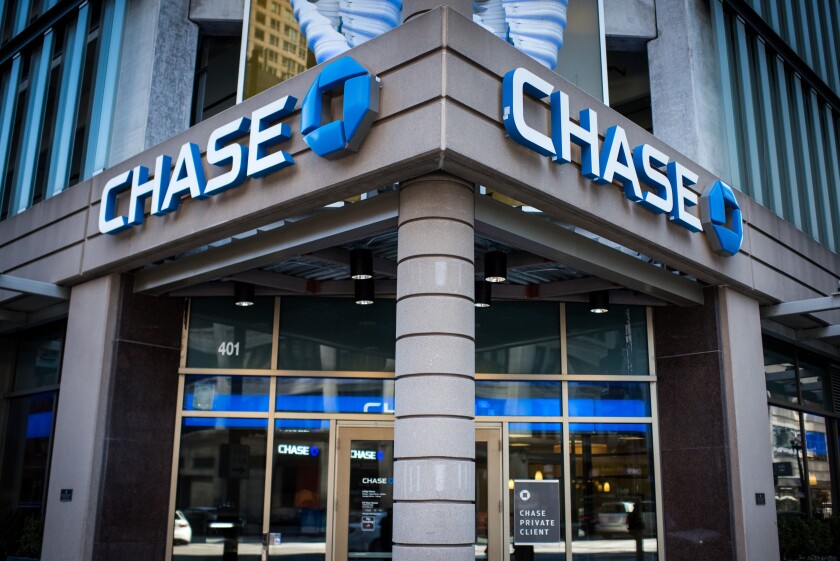JPMorgan Chase has temporarily stopped offering home equity lines of credit due to the nationwide surge in unemployment and projections that U.S. home prices could decline substantially amid the coronavirus pandemic.
The $3.1 trillion-asset bank said Thursday that it is taking steps to mitigate risks in the housing market as it prepares for a surge in defaults by homeowners.
“Due to the economic uncertainty, we’re temporarily pausing new applications for home equity lines of credit,” said Amy Bonitatibus, chief marketing officer at Chase Home Lending.
The New York bank's customers can still tap into their home’s equity through a cash-out refinance of their existing mortgage, Bonitatibus said. Last year, JPMorgan originated roughly 33,000 home equity lines of credit and approximately twice as many cash-out refinances, she said.

Spokespeople for Wells Fargo and Bank of America said that those banks are still offering HELOCs.
JPMorgan Chairman and CEO Jamie Dimon warned this week that the bank is preparing for a worst-case scenario in which its credit costs could exceed $45 billion if the economy remains closed for longer than expected. Under projections reviewed by JPMorgan, home values could decline by 10% and the unemployment rate could climb as high as 20%.
Dodger Stadium looks odd now — filled with fake crowd noise and cardboard cutout spectators — but in this downtime it's putting in an almost entirely invisible 5G wireless connection and new point of sale system.
Several companies said this week they’re slashing expenses as the economy limps along. Others would prefer to keep investing in new technologies and hold off on moves like branch closings to better gauge which changes in consumer behavior will stick.
Richard Jones is making post-implementation reviews of standards one of his top priorities, and taking a closer look at FASB’s crowded agenda.
Last week, JPMorgan announced changes to its underwriting standards to ensure that borrowers have equity in their homes if home prices drop nationally. Borrowers applying for home purchase loans now will need a 700 FICO score and a 20% down payment, Bonitatibus said.
The policy changes at JPMorgan come after Fannie Mae's recent announcement to lenders that it is reducing its window for documenting a borrower's income and assets. Fannie will now give lenders 60 days, not the usual 120 days, when purchasing residential mortgages.
That change puts pressure on banks and other financial firms to conduct more due diligence and manual underwriting of lans. It comes at a time when banks are struggling to meet the needs of small businesses and contending with a surge in forbearance requests from homeowners.
The new policies at JPMorgan also come amid rising unemployment. Some 22 million consumers, or 15% of the U.S. workforce, have applied for unemployment insurance in recent weeks.
Mortgage lenders are trying to assess how many homeowners will ask for forbearance as a result of economic damage from the COVID-19 outbreak.
The $2 trillion Coronavirus Aid, Relief, and Economic Security Act passed by Congress late month mandates that all borrowers with government-backed mortgages be allowed to delay mortgage payments for 180 days, and get a further 180-day extension.
A forbearance allows a borrower to defer payments for up to a year for loans backed by Fannie Mae, Freddie Mac and the Federal Housing Administration, as well as smaller government agencies. The deferred payments potentially would be tacked on to the end of a loan and repaid when a borrower refinances or ultimately sells the home.
During the last financial crisis, home prices fell roughly 35% between 2006 and 2009, according to the S&P CoreLogic Case-Shiller home price index.
JPMorgan set aside nearly $8.3 billion in provision for credit losses for the first quarter, up from roughly $1.5 billion in the same period last year and from $1.42 billion in the fourth quarter of 2019.






